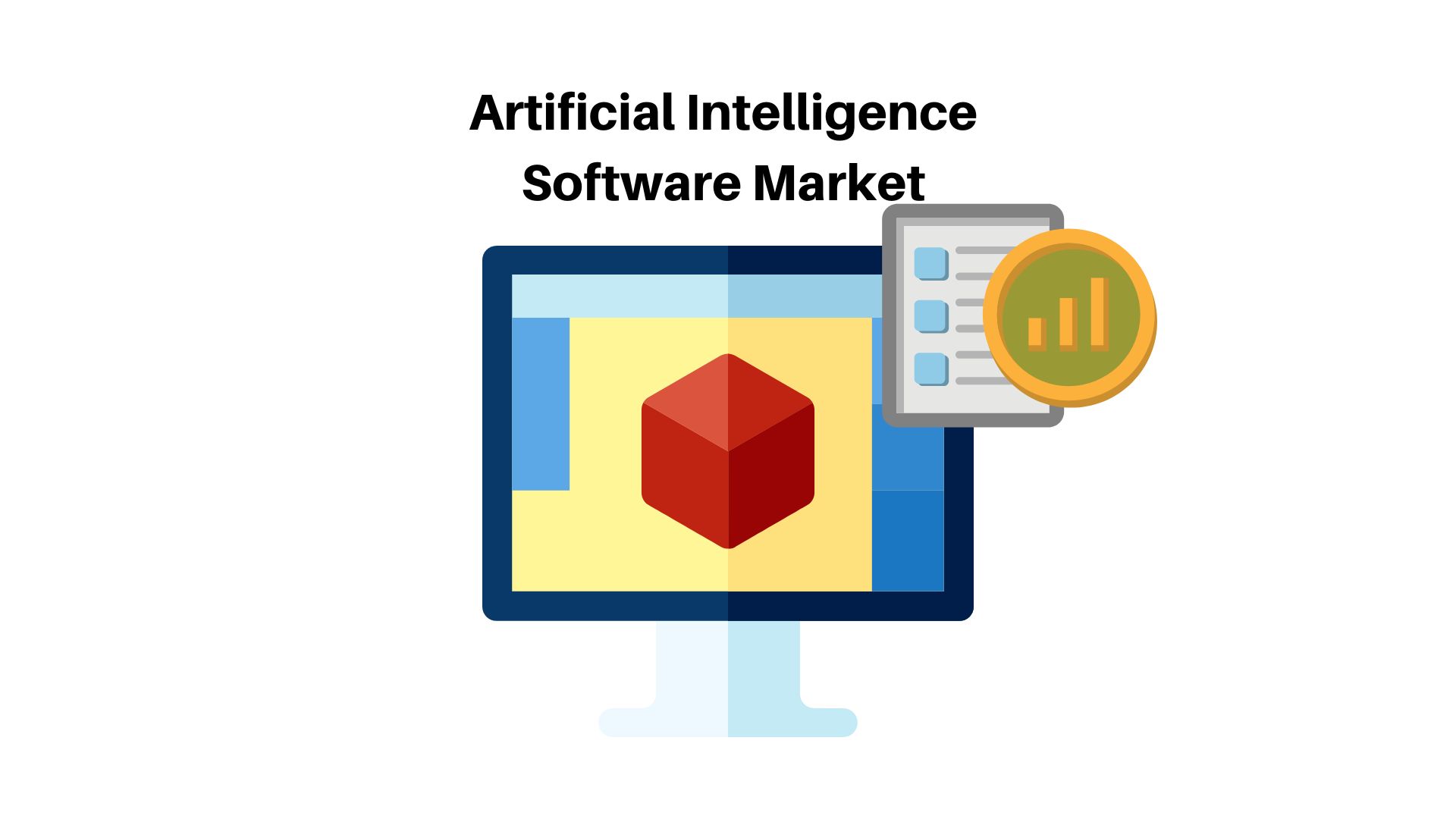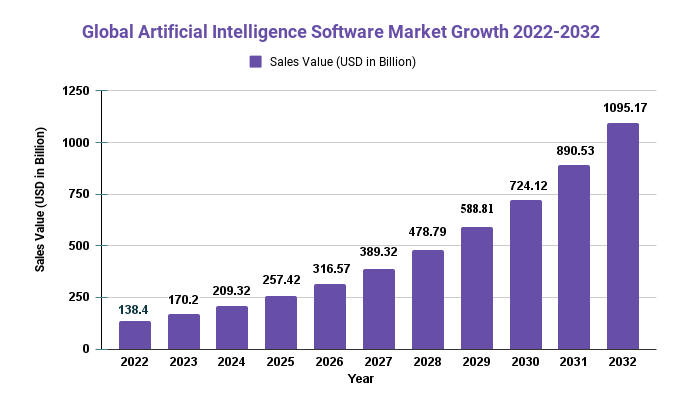Artificial Intelligence Software Market Size Is Projected To Surpass USD 1,095.17 billion by 2032 | CAGR of 22.98%

Page Contents
Market Overview:
The Global Artificial Intelligence Software Market size is expected to be worth around USD 1,095.17 Bn by 2032 from USD 138.40 Bn in 2022, growing at a CAGR of 22.98% during the forecast period from 2022 to 2032.
The artificial intelligence software market is experiencing explosive growth as businesses increasingly rely on AI technology to enhance customer interactions, streamline internal processes, and boost productivity. Governments and organizations around the world are investing heavily in AI solutions, spurring a surge in demand for sophisticated applications that automate complex tasks. With advances in machine learning, natural language processing, and computer vision technologies, AI-based software is capable of handling everything from data analysis to intelligent automation.
AI technology is being adopted across a range of industries, such as healthcare, automotive, financial services, and retail. Healthcare organizations are using AI solutions to diagnose illnesses more rapidly and accurately than ever before while automotive manufacturers are using AI-enabled systems to increase driving safety by detecting obstructions or responding to hazardous road conditions faster than humans can.
AI software's ability to automate processes, analyze data and make decisions quickly provides businesses with a range of advantages that can drive growth and profitability. Accordingly, the demand for this type of technology is expected to surge in the coming years, providing ample opportunities for both established players and start-ups alike.
Request For Sample Report Here: https://market.us/report/artificial-intelligence-software-market/request-sample/
Key Takeaways
- The AI software market is expanding rapidly and is predicted to keep expanding over the coming years.
- The rising demand for AI-based solutions across industries such as healthcare, finance, and retail is fueling market expansion.
- The development of AI solutions, their integration with other technologies, and expansion into emerging markets provide prospects for growth and innovation in the AI software market.
- The AI software market faces numerous obstacles, such as lack of standardization and data quality/availability issues; lack of explainability and transparency; integration with legacy systems; as well as regulatory and ethical concerns.
- North America, Europe, and Asia-Pacific are the principal markets for AI software; however, other regions are experiencing substantial growth as well.
- The market's growth will be determined by factors such as government initiatives, investments in research and development, and the creation of ethical and transparent AI solutions.
Overall, the AI software market offers businesses a multitude of opportunities to create innovative solutions that address complex problems and add value for customers and stakeholders. However, companies must first address the obstacles facing this space in order to fully exploit AI's potential and foster growth and innovation within it.
Regional Analysis
- North America is a major market for AI software, with the United States leading the charge. This region boasts numerous leading AI software vendors and an expansive ecosystem of AI research and development. The market expansion is being fuelled by rising demand for AI-based solutions across industries such as healthcare, finance, and retail.
- Europe is a significant market for AI software, with countries such as the United Kingdom, Germany, and France leading the growth. This development is due to the increasing adoption of AI in industries like automotive, manufacturing, and energy. Furthermore, Europe boasts many leading AI research institutes that prioritize ethical and transparent AI solutions.
- Asia-Pacific is experiencing a meteoric rise in the market for AI software, led by countries such as China, Japan, and India. This growth is being spurred on by an increasing need for AI solutions across industries like healthcare, finance, and retail. Furthermore, this region boasts many leading AI software vendors and has an intense focus on creating innovative AI solutions.
- Rest of the World This region comprises countries in Latin America, the Middle East, and Africa. Market growth here is being spurred on by the increasing adoption of AI technologies across industries like healthcare, manufacturing, and agriculture however, its rate of expansion may be slower compared to other regions due to a lack of infrastructure and resources.
- Overall, the AI software market is expected to keep expanding globally due to rising demand for AI-based solutions across industries like healthcare, finance, and manufacturing. This growth will also be supported by government initiatives, investments in research and development as well as ethical and transparent AI solutions being created.
Purchase This Report At Discounted Rate Here: https://market.us/purchase-report/?report_id=22778
Drivers
Increased Demand for AI-Based Solutions There is an increasing need for AI-based solutions across various industries, such as healthcare, finance, retail, and manufacturing. Businesses can use this software to automate processes, enhance customer experiences and gain insights from large volumes of data. Advancements in AI Technologies Recent advances in AI technologies such as machine learning, natural language processing, and computer vision have made it simpler and more affordable for businesses to adopt and utilize AI software. Growth of Cloud Computing The rising popularity of cloud computing has made it simpler for businesses to access and deploy AI software. Cloud-based AI solutions provide scalability, adaptability, and cost efficiency.
Big Data Accessibility Thanks to the abundance of big data, businesses are now able to train and develop AI models that make accurate predictions and decisions. Businesses can use AI software to process large volumes of information in order to make more informed decisions. Investment in AI Software Governments, venture capitalists, and private equity firms have seen a marked increase in their investment in AI software. This investment is spurring innovation and the creation of cutting-edge AI technologies.
Overall, these drivers are predicted to continue driving the growth of the AI software market in the upcoming years.
Restraints
Lack of Skilled Workforce Due to a shortage of qualified professionals trained in AI technologies such as machine learning, natural language processing, and computer vision, businesses may find it challenging to adopt and utilize AI software. High Cost of Implementation Adopting AI software can be costly, particularly for small and medium-sized businesses. This may prevent its widespread adoption in certain industries and markets. Lack of Transparency and Interpretability Lacking transparency and interpretability when it comes to AI models can make it difficult to comprehend how they make decisions, potentially discouraging their adoption in industries where decision-making is essential.
Data Privacy and Security Concerns The use of AI software may raise issues about data privacy and security. Businesses must ensure they are collecting, storing, and processing data in a secure and ethical way. Legal and Regulatory Challenges The use of AI software may present legal and regulatory obstacles, such as those related to intellectual property rights, liability claims, and compliance requirements.
Overall, these challenges could potentially slow the growth of the AI software market in the coming years. However, many of these obstacles are being addressed through new technologies, regulations, and standards development.
Opportunities
Development of Specialized AI Solutions There is a potential to create tailored AI solutions for specific industries and use cases. These systems could equip businesses with customized tools that enable them to tackle specific problems and gain an edge in the marketplace. Integration with Other Technologies AI software can be integrated with other technologies, such as the Internet of Things (IoT), blockchain, and cloud computing to create innovative solutions. This integration helps businesses automate processes, improve decision-making and enhance customer experiences. Expansion into Emerging Markets There is an opportunity to expand the adoption of AI software into emerging markets, where demand for such solutions is growing. This expansion can assist businesses in reaching new customers and markets, stimulating growth within the AI software market.
Use of AI to Address Social Challenges AI software can be utilized to tackle social issues like healthcare, education, and environmental sustainability. This presents an opportunity to develop AI solutions with a positive effect on society. Development of Ethical AI Businesses has the opportunity to create AI software that is transparent, explainable, and ethical. Doing so helps businesses build trust with customers and stakeholders while ensuring the use of AI is responsible and ethical.
Overall, these opportunities are expected to fuel innovation and growth in the AI software market over the coming years. Businesses can take advantage of these possibilities by developing creative AI solutions that solve complex problems and add value for customers and stakeholders.
Challenges
Lack of Standardization Absent standardization in AI technologies, it can be challenging to compare and evaluate different AI solutions. Furthermore, the lack of uniformity makes it challenging for businesses to create and implement interoperable AI solutions. Data Quality and Availability AI software relies on large volumes of high-quality data to make accurate predictions and decisions. Unfortunately, there are challenges associated with data quality and availability such as silos, bias, and privacy concerns. Explainability and Transparency Absent explanation and transparency in AI models, it may be difficult to comprehend how they make decisions. This could erode trust and restrict the adoption of AI solutions in certain industries and use cases.
Integration with Legacy Systems Many businesses possesses legacy systems that are incompatible with AI software, making it challenging to implement solutions and restricting the adoption of this technology. Regulatory and ethical Issues The use of AI software raises regulatory and ethical questions, such as data privacy, bias, and accountability. These worries can inhibit the adoption of AI solutions while creating legal and reputational risks for businesses.
Overall, these issues must be overcome in order to spur growth and innovation in the AI software market. By creating standardized, transparent, and interoperable AI solutions that address these obstacles, businesses can unlock the full potential of AI technology while creating value for their customers and stakeholders.
Recent Development
- VUNO recently reported that Taiwan's Food and Drug Administration had given them permission to market their artificial intelligence fundus software. This AI system can quickly identify retinal diseases with high precision.
- UrbanTide, a technology company, recently released artificial intelligence software to detect houses with insufficient energy efficiency. This advanced AI program could save homeowners money on utility bills. Authorities, associations, and service care providers can utilize the data collected by this cutting-edge AI program for practical solutions.
- On October 20, 2022, IBM unveiled an expansive portfolio of embedded artificial intelligence software. This new offering grants customers access to AI libraries that power popular IBM Watson products and provides industry-leading solutions that improve end-user experiences.
Key Market Segments
Type
- On-Premise
- Cloud-based
Application
- Voice Processing
- Text Processing
- Image Processing
Key Market Players
- Baidu
- IBM
- Microsoft
- SAP
- Intel
- Salesforce
- Brighterion
- KITT.AI
- IFlyTek
- Megvii Technology
- Albert Technologies
- H2O.ai
- Brainasoft
- Yseop
- Ipsoft
- NanoRep(LogMeIn)
- Ada Support
- Astute Solutions
Report Scope
| Report Attribute | Details |
| The market size value in 2022 | USD 138.40 Bn |
| Revenue forecast by 2032 | USD 1,095.17 Bn |
| Growth Rate | CAGR Of 22.98% |
| Regions Covered | North America, Europe, Asia Pacific, Latin America, and Middle East & Africa, and the Rest of the World |
| Historical Years | 2017-2022 |
| Base Year | 2022 |
| Estimated Year | 2023 |
| Short-Term Projection Year | 2028 |
| Long-Term Projected Year | 2032 |
Contact us
Contact Person: Mr. Lawrence John
Market.us (Powered By Prudour Pvt. Ltd.)
Tel: +1 718 618 4351
Send Email: [email protected]
The team behind market.us, marketresearch.biz, market.biz and more. Our purpose is to keep our customers ahead of the game with regard to the markets. They may fluctuate up or down, but we will help you to stay ahead of the curve in these market fluctuations. Our consistent growth and ability to deliver in-depth analyses and market insight has engaged genuine market players. They have faith in us to offer the data and information they require to make balanced and decisive marketing decisions.
